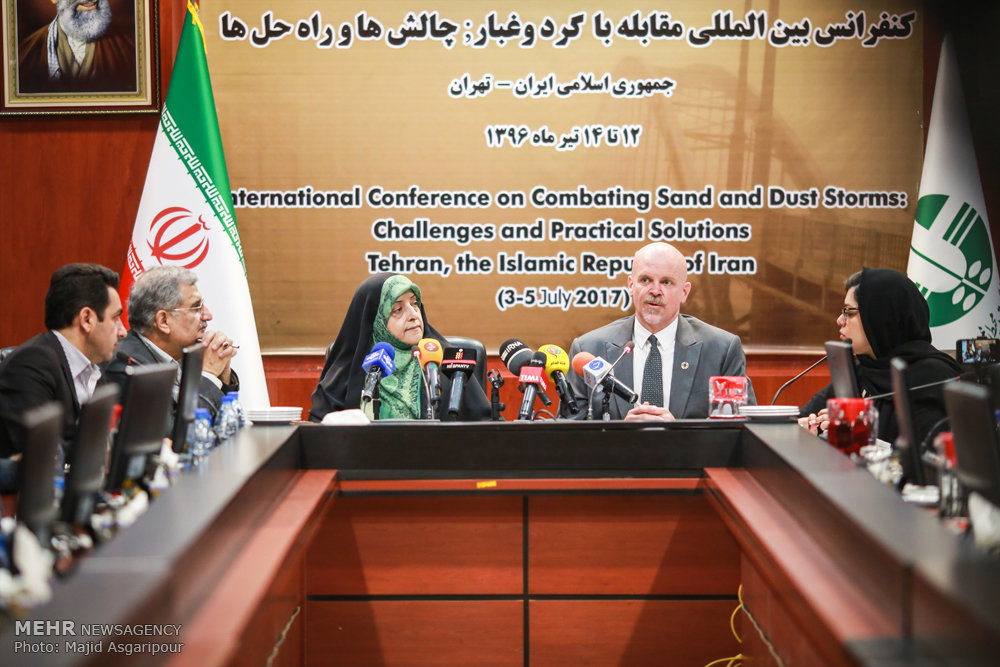Iran to hold intl. conference on dust storms, details announced

TEHRAN – Representatives from thirty countries will convene this week in Tehran to look collectively into dust and sand storms, what Iran’s environment chief Masoumeh Ebtekar hailed as “a very key event for” Iran and the entire region.
Due to take place on July 3-5, the meeting entitled “International Conference on Combating Sand and Dust Storms: Challenges and Practical Solutions” will be hosted by Iran’s Department of Environment and Foreign Ministry, with the cooperation of the Department of Economic and Social Affairs of the United Nations Secretariat, UN Environment and the UN Development Program among others.
“The international event is backed by a number of UN resolutions,” Ebtekar briefed media outlets on Saturday on the conference, expressing hope that it proves “a step forward.”
Iran’s initiative to host the international event was taken note of last year in a resolution ratified by the United Nations General Assembly.
UN organizations passed four resolutions of combating dust and sand storms, with Tehran playing a key role.
International participants will consist of 14 ministers, senior officials, country experts, international resource persons and policy makers from all regions as well as experts from regional and international organizations and UN entities.
According to a UN document, the running themes of the conference include reviewing global and regional trends of sand and dust storms and their social, economic and environmental impact and costs, observing, monitoring, predicting and early warning systems, exploring policy options, technology innovations and investment opportunities and looking into global, regional and cross-sectorial cooperation.
Over the past years, due to its geography Iran has been taking the brunt of devastating dust and sand storms.
“Nearly 80 percent of the storms originate from external hotspots,” Ebtekar said, citing Turkey, Iraq, Saudi Arabia, Afghanistan, Turkmenistan and Tajikistan.
Over the past 15 years, there has been a significant increase “in the frequency and the intensity of sand and dust storms” in the Middle East, said Enric Terradellas, a meteorologist with the World Meteorology Organization’s sand and dust storm prediction center for the region.
Mismanagement of land and water has been a key factor, as well as climate change.
Iran has undertaken “immense effort” to combat the phenomenon, Gary Lewis, the UN resident coordinator in Iran, said in the briefing session, describing Iran as a “world leader to draw attention to and combat sand storms.”
The conference seeks to achieve three goals of coming up with a “ministerial declaration”, discussing “a set of policy options and technical recommendations” and leaving participants with “an understanding of the efforts Iran is already undertaking.”
However, these takeaways are not “bounding” and countries will decide if they abide by fully or partially, Lewis said in response to a question by The Tehran Times.
Providing some hints into the content of the declaration, to be named the Tehran Declaration, Ebtekar told The Tehran Times: “The ministerial declaration is going to reflect some of the deliberations we will have in the conference. It will deal with different dimensions and broader aspects of sand storms at regional and international levels.”
“It will deal with some actions that should be taken by governments to address the issue, and also, it will deal with different international bodies involved in the issue, and the measures they can take.”
Regional conflicts and environmental challenges
Regional conflicts, however, dent expectations of the UN-backed event. The political dynamics of the Middle East region has been in a flux of change over the past years.
Wars in Syria, Iraq, Yemen, and Libya have marginalized environmental concerns.
The clashes have divided other countries in the area. Iran and Saudi Arabia, as key regional powers, have no political relations for over a year now, and back opposing sides in Syria.
Qatar, a small Arab country, has been sanctioned for nearly a month now by its fellow Arab states.
And Turkey is grappling with domestic instability raised by Kurdish groups.
“Peace and security are prerequisites for sustainable development and prosperity, and for the protection of the environment. When there are regional conflicts, alongside the humanitarian issues, you have challenges in dealing with the environment,” Ebtekar told The Tehran Times in English on the sidelines of the session.
“So, yes, this is an issue, and we have already seen the consequences of security issues that we had in Iraq and in the region…” she added.
In a similar vein, Lewis urged regional states to join hands and “look past the hostilities.”
“I think that we will come to find one day that the conflicts that are preoccupying us right now pale into insignificance when compared with the environmental challenges…” he told The Tehran Times.
“We need to look past a lot of these animosities that we have with each other and get together as a human species and figure out how we’re gonna fix that problem.”
PA/SP
Leave a Comment